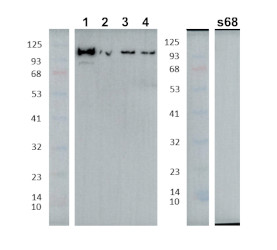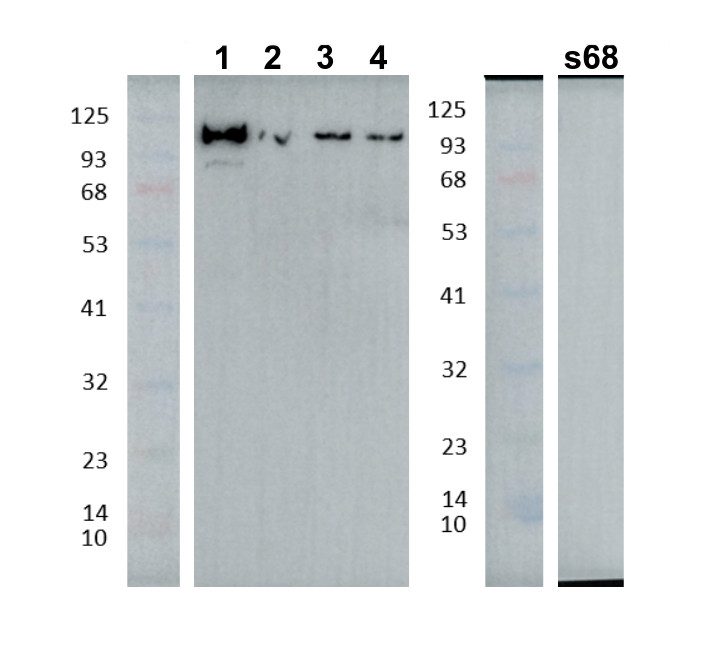1

Anti-AARE | Acyloamino acid releasing enzyme
- Product Info
-
Immunogen: KLH-conjugated peptide derived from Arabidopsis thaliana AARE, UniProt: A0A2H1ZEM8 TAIR: AT4G14570 Host: Rabbit Clonality: Polyclonal Purity: Antigen affinity purified serum, in PBS pH 7.4 Format: Lyophilized Quantity: 50 µg Reconstitution: For reconstitution, add 50 µl of sterile or deionized water. Storage: Store lyophilized/reconstituted at -20°C; once reconstituted make aliquots to avoid repeated freeze-thaw cycles. Please, remember to spin tubes briefly prior to opening them to avoid any losses that might occur from lyophilized material adhering to the cap or sides of the tubes. Tested applications: Western blot (WB) Recommended dilution: 1 : 1000 (WB) Expected | apparent MW: 90.4 kD - Reactivity
-
Confirmed reactivity: Arabidopsis thaliana Predicted reactivity: Brachypodium distachyon, Brassica napus, Nicotiana tabacum, Solanum lycopresicum, Solanum tuberosum, Pisum sativum, Physcomitrella patens, Hordeum vulgare, Oryza sativa, Zea mays, Sorghum bicolor, Triticum sp.
Species of your interest not listed? Contact usNot reactive in: No confirmed exceptions from predicted reactivity are currently known - Application Examples
-

Samples:
Arabidopsis thaliana (1-4) expressing an AtAARE:eGFP fusion (~110 kDa) under the control of the AtUbiq10 promoter (https://doi.org/10.1111/j.1365-313X.2010.04322.x) in the AtAARE mutant background (s68, https://doi.org/10.1038/s42003-023-04428-7).
Proteins were extracted from rosette leaves (~5–6 weeks old) in 50 mM PBS, 0.1% Triton X-100, 0.2 mM DTT, and 2 mM EDTA. For each sample, 50 μg of protein was mixed with Laemmli buffer containing β- mercaptoethanol, heated at 70°C for 5 minutes, and separated via SDS-PAGE. Proteins were transferred to a PVDF membrane (Merck, IPVH00010), and free binding sites were blocked with 5% milk (Roth, T145.3) overnight at 4°C with gentle agitation. The primary antibody (anti-AtAARE, AS23 4906) was diluted 1:1000 in TBS-T containing 2.5% milk (Roth, T145.3) and incubated with the membrane for 2 hours at room temperature with gentle agitation. The membrane was washed briefly twice, then twice for 5 minutes each, and once for 15 minutes in 30 mL TBS-T. The secondary antibody (anti-rabbit, HRP-conjugated secondary antibodies) was diluted 1:3000 in TBS-T with 2.5% milk (Roth, T145.3) and incubated with the membrane for 1 hour at room temperature with gentle agitation. Washing steps were repeated as described above. Detection was performed using chemiluminescent detection reagent and imaged using an ImageQuant 800 system (Cytiva).Courtesy of Dr. Sebastian Hoernstein, University of Freiburg, Germany
- Background
-
Background: Acylamino acid releasing enzyme (AARE) located in the cytoplasm is facilitating the cleavage of an N-acetyl or N-formyl amino acid from the N-terminus of a polypeptide. - Protocols
-
Agrisera Western Blot protocol and video tutorials
Protocols to work with plant and algal protein extracts
Agrisera Educational Poster Collection - Reviews:
-
This product doesn't have any reviews.



